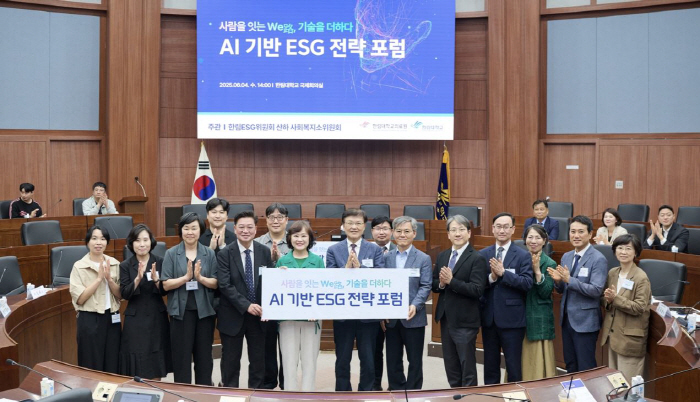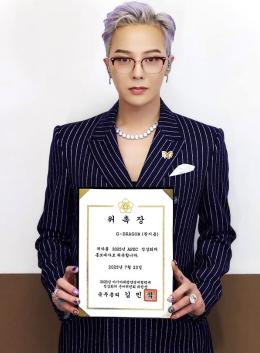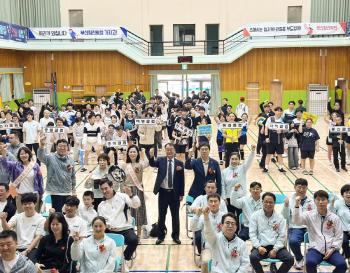Establish ESG Strategy with AI Technology...Holding a strategic forum for Ilsong Academy, a school corporation
Jun 17, 2025
Amid growing social interest in ESG (Environmental, Social and Governance) management, a place has been set up to explore ESG strategies using artificial intelligence (AI) technology.
On June 4, the Hallim ESG Committee under Ilsong Academy (Chairman Yoon Hee-sung) held a AI-based ESG Strategy Forum' in the International Conference Room of Hallim University. Under the theme of 'Adding Wero Technology Connecting People', experts from various institutions such as medical, welfare, and education gathered to share AI application cases and discuss future ESG strategies based on this.
At the event, 65 heads and employees of Ilsong Academy, including Choi Yang-hee, president of Hallym University, and Yoo Kyung-ho, president of medical school, attended the event, and about 100 people participated in the online broadcast, targeting a total of 165 people. The event consisted of a total of four presentations and one public forum.
◇ Announcement of cases using AI technology in medical and welfare sites
Park Seop-hyung, head of the AI Convergence Research Institute at Hallym University, as the first presenter, introduced the use of AI in the social welfare sector in major overseas countries such as the United States, Japan, and Europe. He explained that AI is mainly used in caring robots, interactive chatbots, and prediction-based case management, and it is bringing positive effects such as reduced burnout of social workers, response to aging, and administrative efficiency.
Director Park emphasized ethical responsibility and human-centered design along with technological advances, saying, `AI in the current welfare field is a tool to increase efficiency, but the center is still people.'
Subsequently, a presentation on the non-face-to-face treatment platform On (溫) Care (Hwang Sang-geun, head of the digital innovation team at Hallym University Medical Center) was held. On (溫) Care is an integrated face-to-face and non-face-to-face treatment system developed by Hallym University Medical Center that enables remote treatment and prescription as well as video consultation and various counseling.
As non-face-to-face treatment became possible with one click, access to medical care for the medical vulnerable, rare patients, the elderly, and office workers who have difficulty visiting hospitals improved. In addition, real-time translation subtitle service using AI was provided to improve the quality of medical services for multicultural families and foreign patients. In the future, it plans to expand to various AI-based services such as chatbot counseling and document automation.
A case of developing a 'customized medical social welfare app' for discharged patients and guardians was also announced (Koo Hyang-na, a social worker at Hallim University Gangnam Sacred Heart Hospital).
When patients who are about to be discharged return to their daily lives, they often need social help. However, in reality, it is not easy to grasp what welfare I can receive and which agency is in charge of it.
Developed by Hallym University's Gangnam Sacred Heart Hospital, the app is linked to hospital medical information (EMR) to automatically guide public welfare information and private services appropriate to the patient's situation. Thanks to this, welfare information scattered to patients and caregivers who are about to be discharged is collected and customized. He also explained that the app can solve questions anytime, anywhere, increasing access to welfare as there is no need to visit an institution or talk on the phone.
Cases of AI application in welfare sites were also introduced. Lee Jung-wook, director of the Yeongdeungpo Senior Welfare Center, introduced a safety check system for isolated seniors through AI callbot and said, "AI chatbot and phone care system are also effective in supporting elderly emotions."He explained, and Jeon Jae-il, head of the Shinlim General Social Welfare Center, introduced a smart work system using Google workspace and said, `The introduction of Google-based smart work allows workers to focus more on caring than administration.'
◇ From adolescents to the elderly… Propose various ESG ideas using AI
In the second half of the forum, a forum for public debate was held under the theme of 'AI convergence, imagination to practice' to share AI field ideas from each institution.
Hallim Youth Independence Support Center (Director Ko Yoon-soon) proposed an AI-based comprehensive diagnosis and training system for borderline intelligence youth and announced a platform plan to provide customized social training contents by integrating behavior, emotion, and learning data.
AI daily support solutions for the elderly were also mentioned. It proposed an AI helper system that can perform daily life assistance functions such as AI-based nutrition counseling, personalized education, counseling curator, and schedule reminders. In addition, Hwaseong City Dongtan Senior Welfare Center presented a voice-based AI counseling kiosk for the elderly and a health examination-based AI nutritional diet recommendation model, emphasizing the possibility of regional spread of digital care services.
Choi Yang-hee, president of Hallym University, said, `The core of ESG management is people, and we should strive to design AI technology in a human-centered way and develop it in a way that can embrace the socially disadvantaged in all fields such as healthcare, welfare, and education"In the future, we must continue to fulfill our social responsibilities by gathering knowledge and experience so that AI can become the basis for empathy and solidarity beyond technology."
Choi Sung-sook, chairman of the Social Welfare Subcommittee of Hallim ESG Committee (Director of Sillim General Social Welfare), said, "When ESG values and AI technology meet each other, innovation is possible. We will use AI as a great tool and realize innovative ESG strategies based on the view that the center of ESG is people." he said.
Ilsong Academy, a school corporation, plans to continue its efforts to develop an ESG model that integrates medical care, welfare, and education with AI in the future in connection with the Wero campaign.
On June 4, the Hallim ESG Committee under Ilsong Academy (Chairman Yoon Hee-sung) held a AI-based ESG Strategy Forum' in the International Conference Room of Hallim University. Under the theme of 'Adding Wero Technology Connecting People', experts from various institutions such as medical, welfare, and education gathered to share AI application cases and discuss future ESG strategies based on this.
At the event, 65 heads and employees of Ilsong Academy, including Choi Yang-hee, president of Hallym University, and Yoo Kyung-ho, president of medical school, attended the event, and about 100 people participated in the online broadcast, targeting a total of 165 people. The event consisted of a total of four presentations and one public forum.
◇ Announcement of cases using AI technology in medical and welfare sites
Park Seop-hyung, head of the AI Convergence Research Institute at Hallym University, as the first presenter, introduced the use of AI in the social welfare sector in major overseas countries such as the United States, Japan, and Europe. He explained that AI is mainly used in caring robots, interactive chatbots, and prediction-based case management, and it is bringing positive effects such as reduced burnout of social workers, response to aging, and administrative efficiency.
Director Park emphasized ethical responsibility and human-centered design along with technological advances, saying, `AI in the current welfare field is a tool to increase efficiency, but the center is still people.'
Subsequently, a presentation on the non-face-to-face treatment platform On (溫) Care (Hwang Sang-geun, head of the digital innovation team at Hallym University Medical Center) was held. On (溫) Care is an integrated face-to-face and non-face-to-face treatment system developed by Hallym University Medical Center that enables remote treatment and prescription as well as video consultation and various counseling.
As non-face-to-face treatment became possible with one click, access to medical care for the medical vulnerable, rare patients, the elderly, and office workers who have difficulty visiting hospitals improved. In addition, real-time translation subtitle service using AI was provided to improve the quality of medical services for multicultural families and foreign patients. In the future, it plans to expand to various AI-based services such as chatbot counseling and document automation.
A case of developing a 'customized medical social welfare app' for discharged patients and guardians was also announced (Koo Hyang-na, a social worker at Hallim University Gangnam Sacred Heart Hospital).
When patients who are about to be discharged return to their daily lives, they often need social help. However, in reality, it is not easy to grasp what welfare I can receive and which agency is in charge of it.
Developed by Hallym University's Gangnam Sacred Heart Hospital, the app is linked to hospital medical information (EMR) to automatically guide public welfare information and private services appropriate to the patient's situation. Thanks to this, welfare information scattered to patients and caregivers who are about to be discharged is collected and customized. He also explained that the app can solve questions anytime, anywhere, increasing access to welfare as there is no need to visit an institution or talk on the phone.
Cases of AI application in welfare sites were also introduced. Lee Jung-wook, director of the Yeongdeungpo Senior Welfare Center, introduced a safety check system for isolated seniors through AI callbot and said, "AI chatbot and phone care system are also effective in supporting elderly emotions."He explained, and Jeon Jae-il, head of the Shinlim General Social Welfare Center, introduced a smart work system using Google workspace and said, `The introduction of Google-based smart work allows workers to focus more on caring than administration.'
◇ From adolescents to the elderly… Propose various ESG ideas using AI
In the second half of the forum, a forum for public debate was held under the theme of 'AI convergence, imagination to practice' to share AI field ideas from each institution.
Hallim Youth Independence Support Center (Director Ko Yoon-soon) proposed an AI-based comprehensive diagnosis and training system for borderline intelligence youth and announced a platform plan to provide customized social training contents by integrating behavior, emotion, and learning data.
AI daily support solutions for the elderly were also mentioned. It proposed an AI helper system that can perform daily life assistance functions such as AI-based nutrition counseling, personalized education, counseling curator, and schedule reminders. In addition, Hwaseong City Dongtan Senior Welfare Center presented a voice-based AI counseling kiosk for the elderly and a health examination-based AI nutritional diet recommendation model, emphasizing the possibility of regional spread of digital care services.
Choi Yang-hee, president of Hallym University, said, `The core of ESG management is people, and we should strive to design AI technology in a human-centered way and develop it in a way that can embrace the socially disadvantaged in all fields such as healthcare, welfare, and education"In the future, we must continue to fulfill our social responsibilities by gathering knowledge and experience so that AI can become the basis for empathy and solidarity beyond technology."
Choi Sung-sook, chairman of the Social Welfare Subcommittee of Hallim ESG Committee (Director of Sillim General Social Welfare), said, "When ESG values and AI technology meet each other, innovation is possible. We will use AI as a great tool and realize innovative ESG strategies based on the view that the center of ESG is people." he said.
Ilsong Academy, a school corporation, plans to continue its efforts to develop an ESG model that integrates medical care, welfare, and education with AI in the future in connection with the Wero campaign.
|
This article was translated by Naver AI translator.














